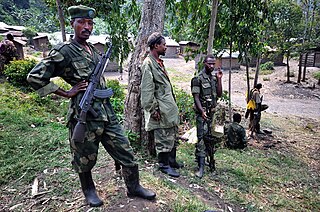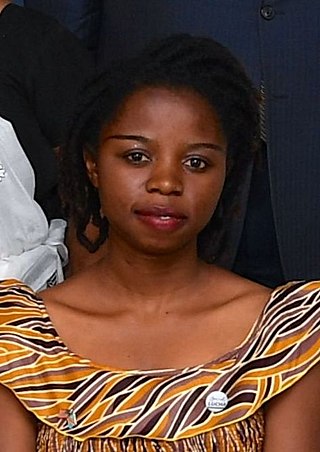The earliest known human settlements in what is now the Democratic Republic of the Congo have been dated back to the Middle Stone Age, approximately 90,000 years ago. The first real states, such as the Kongo, the Lunda, the Luba and Kuba, appeared south of the equatorial forest on the savannah from the 14th century onwards.

Laurent-Désiré Kabila or more succinctly, Laurent Kabila, was a Congolese revolutionary and politician who served as the third President of the Democratic Republic of the Congo from 1997 until his assassination in 2001.

The Democratic Republic of the Congo, also known as Congo-Kinshasa, DRC, DR Congo, or simply the Congo and known from 1971–1997 as Zaire, is a country in Central Africa. By land area, the DRC is the second-largest country in Africa and the 11th-largest in the world. With a population of around 112 million, the Democratic Republic of the Congo is the most populous officially Francophone country in the world. The national capital and largest city is Kinshasa, which is also the economic center. The country is bordered by the Republic of the Congo, Central African Republic, South Sudan, Uganda, Rwanda, Burundi, Tanzania, Zambia, Angola, the Cabinda exclave of Angola and the South Atlantic Ocean.

The Second Congo War, also known as Africa's World War or the Great War of Africa or the Great African War, began in the Democratic Republic of the Congo in August 1998, little more than a year after the First Congo War, and involved some of the same issues.

Goma is the capital of North Kivu province in the eastern Democratic Republic of the Congo. It is located on the northern shore of Lake Kivu, next to the Rwandan city of Gisenyi. The lake and the two cities are in the Albertine Rift, the western branch of the East African Rift system. Goma lies only 13–18 km (8.1–11.2 mi) south of the active Nyiragongo Volcano. The recent history of Goma has been dominated by the volcano and the Rwandan genocide of 1994, which in turn fueled the First and Second Congo Wars. The aftermath of these events was still having effects on the city and its surroundings in 2010. The city was captured by rebels of the March 23 Movement during the M23 rebellion in late 2012, but it has since been retaken by government forces.

Étienne Tshisekedi wa Mulumba was a Congolese politician and the leader of the Union for Democracy and Social Progress (UDPS), the main opposing political party in the Democratic Republic of the Congo (DRC). A long-time opposition leader, he served as Prime Minister of the country on three brief occasions: in 1991, 1992–1993, and 1997. He was also the father of the current President, Felix Tshisekedi.
Ernest Wamba dia Wamba was a prominent Congolese academic and political theorist who became a commander of the Kisangani faction of the rebel Rally for Congolese Democracy during the Second Congo War.

Azarias Ruberwa Manywa is a Congolese politician, lawyer, and public figure. During the Second Congo War he was Secretary-General of the Rassemblement Congolais pour la Démocratie (RCD-G) rebel group. Following the war he was one of the vice-presidents in the transitional government of the Democratic Republic of the Congo between 2003-2006. He has also been the leader and president of RCD-G's political party since 2003. He is a member of the Banyamulenge community of South Kivu who belong to the Tutsi ethnic group.

Eugène Serufuli Ngayabaseka is a Congolese politician, the ex 2nd Vice President of the Congolese Rally for Democracy-Goma and was the governor of Nord-Kivu province from July 31, 2000 until 2007, when was succeeded by the RCD-K-ML candidate, Paluku Kahongya Julien.

Parliamentary elections were held in the Republic of the Congo in 1992, along with a presidential election, marking the end of the transition to multiparty politics. The election was held in two rounds, the first on 24 June 1992 and the second on 19 July 1992. The Pan-African Union for Social Democracy (UPADS)—led by Pascal Lissouba, who won the presidential election—won a plurality of seats (39), while the Congolese Movement for Democracy and Integral Development (MCDDI) of second place presidential candidate Bernard Kolélas won the second highest number of seats (29). Following in third place was the Congolese Labor Party (PCT), which had been the ruling party during single-party rule.

Moïse Katumbi Chapwe is a Congolese businessman and politician. He was Governor of Katanga Province, located in the southern part of the Democratic Republic of the Congo, from 2007 to September 2015. He was a member of the People's Party for Reconstruction and Democracy (PPRD) until September 2015. He has been described by The Economist as "probably the second most powerful man in the Democratic Republic of Congo after the president, Joseph Kabila". Jeune Afrique named him "African of the Year" in 2015.

The Kivu conflict is an umbrella term for a series of protracted armed conflicts in the North Kivu and South Kivu provinces in the eastern Democratic Republic of the Congo which have occurred since the end of the Second Congo War. Including neighboring Ituri province, there are more than 120 different armed groups active in the eastern Democratic Republic of Congo. Currently, some of the most active rebel groups include the Allied Democratic Forces, the Cooperative for the Development of the Congo, the March 23 Movement, and many local Mai Mai militias. In addition to rebel groups and the governmental FARDC troops, a number of national and international organizations have intervened militarily in the conflict, including the United Nations force known as MONUSCO, and an East African Community regional force.
Bernard Bakana Kolélas was a Congolese politician and President of the Congolese Movement for Democracy and Integral Development (MCDDI). Kolélas was a long-time opponent of the single-party rule of the Congolese Labour Party (PCT), and after the introduction of multiparty politics in the early 1990s he was one of Congo-Brazzaville's most important political leaders. He placed second in the August 1992 presidential election, behind Pascal Lissouba; subsequently he was mayor of Brazzaville, the capital, during the mid-1990s, and he briefly served as Prime Minister of Congo-Brazzaville during the 1997 civil war. After rebel forces prevailed in the civil war, he lived in exile for eight years until an amnesty made it possible for him to return; he was then elected to the National Assembly in 2007.
The Congolese Rally for Democracy–Goma was a faction of the Congolese Rally for Democracy, a rebel movement based in Goma, Democratic Republic of the Congo (DRC) during the Second Congo War (1998–2003). After the war, some members of the group continued sporadic fighting in North Kivu. The movement also entered mainstream politics, participating in democratic elections with little success.

The M23 rebellion was an armed conflict in North Kivu, Democratic Republic of the Congo (DRC), that occurred between the March 23 Movement and government forces between 4 April 2012 and 7 November 2013. It ended when a peace agreement was made among eleven African nations, and the M23 troops surrendered in Uganda. The rebellion was part of continued fighting in the region after the formal end of the Second Congo War in 2003. The conflict reignited in late 2021 after rebel "general" Sultani Makenga and 100 rebel fighters attacked the border town of Bunagana but failed. A few months later, with a much larger force, the rebels of the M23 movement renewed their attack and captured Bunagana.

The March 23 Movement, often abbreviated as M23 and also known as the Congolese Revolutionary Army, is a Congolese rebel military group that is for the most part formed of ethnic Tutsi. Based in eastern areas of the Democratic Republic of the Congo (DRC), it operates mainly in the province of North Kivu. The M23 rebellion of 2012 to 2013 against the DRC government led to the displacement of large numbers of people. On 20 November 2012, M23 took control of Goma, a provincial capital with a population of a million people, but it was requested to evacuate it by the International Conference on the Great Lakes Region because the DRC government had finally agreed to negotiate. In late 2012, Congolese troops, along with UN troops, retook control of Goma, and M23 announced a ceasefire and said that it wanted to resume peace talks.

Major General Jean-Lucien Bahuma Ambamba (1957–2014) was a Congolese army officer. Bahuma, described as an "exceptional soldier" by Le Potentiel and one of the Congo's "most popular and reform-minded officers" by The Economist, commanded the Armed Forces of the Democratic Republic of the Congo (FARDC) in the provinces of North and South Kivu during the M23 rebellion and Allied Democratic Forces insurgency.
Lutte Pour Le Changement is a group based in Goma in eastern Democratic Republic of Congo who fights for a class of rights that protect Congoleses' freedom from infringement by governments, social organizations, and private individuals. They ensure one's ability to participate in the civil and political life of the Congolese society and state without discrimination or repression.

Rebecca Kabugho is a Congolese activist who was detained by the government. She was said to be one of the youngest prisoners of conscience and she was given an International Women of Courage Award in 2017.
François Luc Macosso was a Congolese politician.














